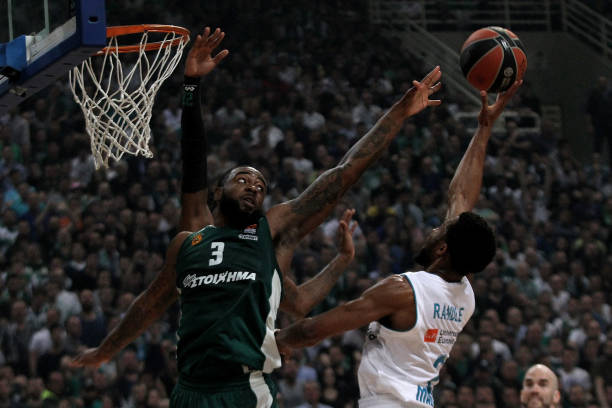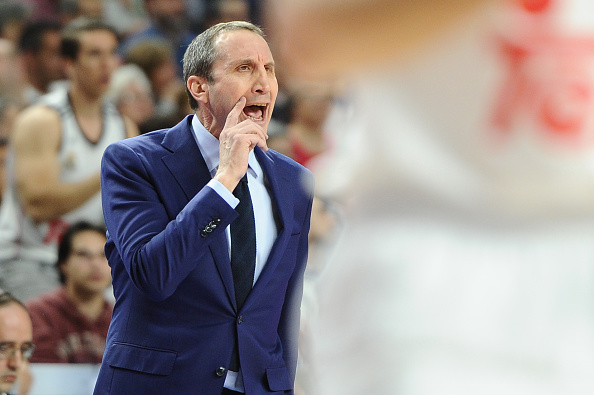A game of chess with Death…
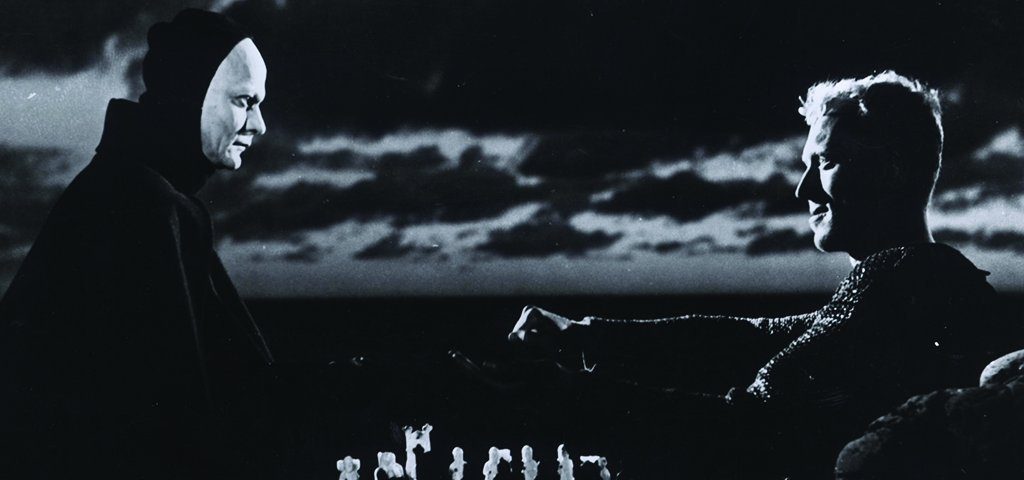
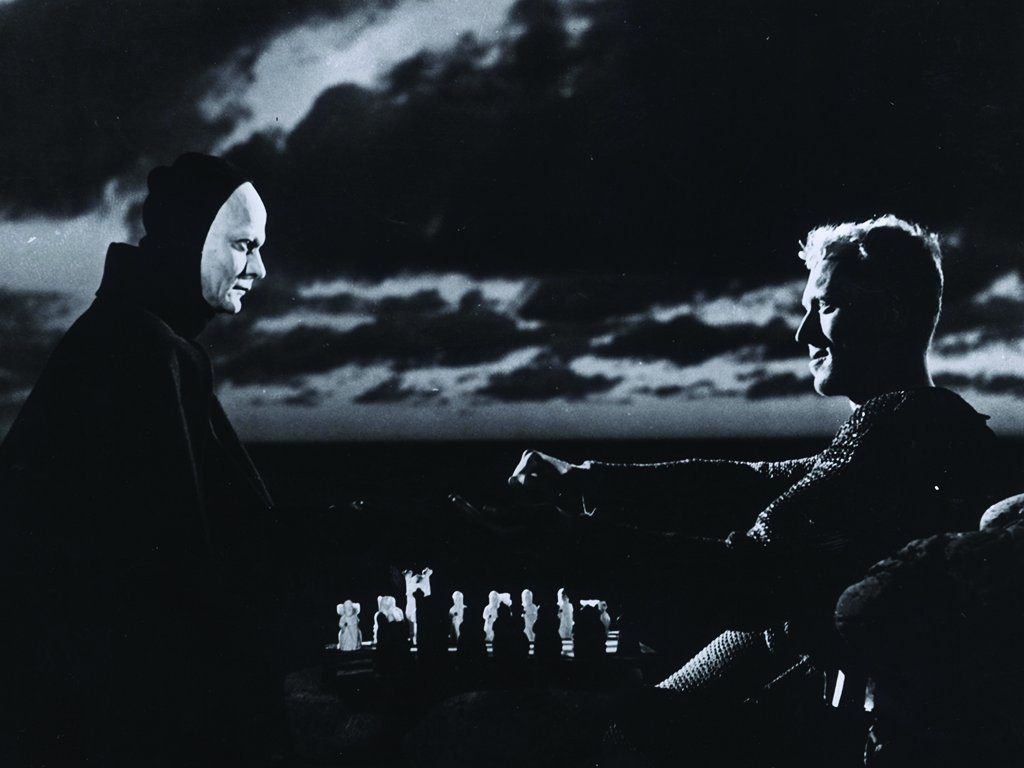
By Jim Katsionis on 23 April 2018
The different paths, the same reality and the “Seventh Seal” of the “eternals”. With Ingmar Bergman’s train of thought for a guide, Hoopfellas takes on the extreme situation that both Greek teams have found themselves in after week 1 of the playoffs, while evaluating their chances in the upcoming games..
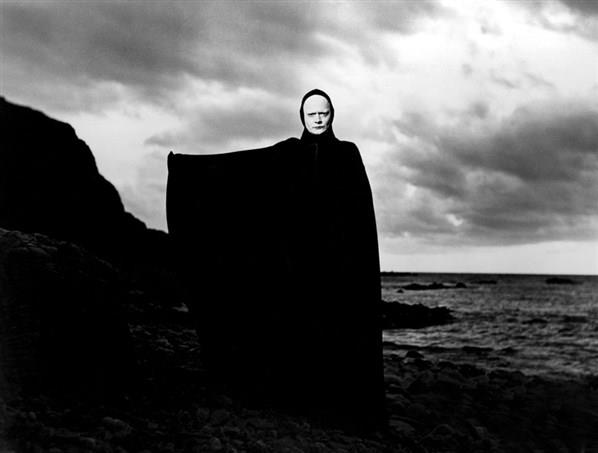
In the first hot week of this Euroleague’s playoffs, Panathinaikos and Olympiacos went from heaven to hell and back, as the champions, Fener, and CSKA Moscow doubled their victories and are now with one foot in Belgrade. The series are 1-1 for the Greek teams and now Madrid and Kaunas are waiting in the form of a great test and a huge challenge at the same time. Shall we finish the game..?
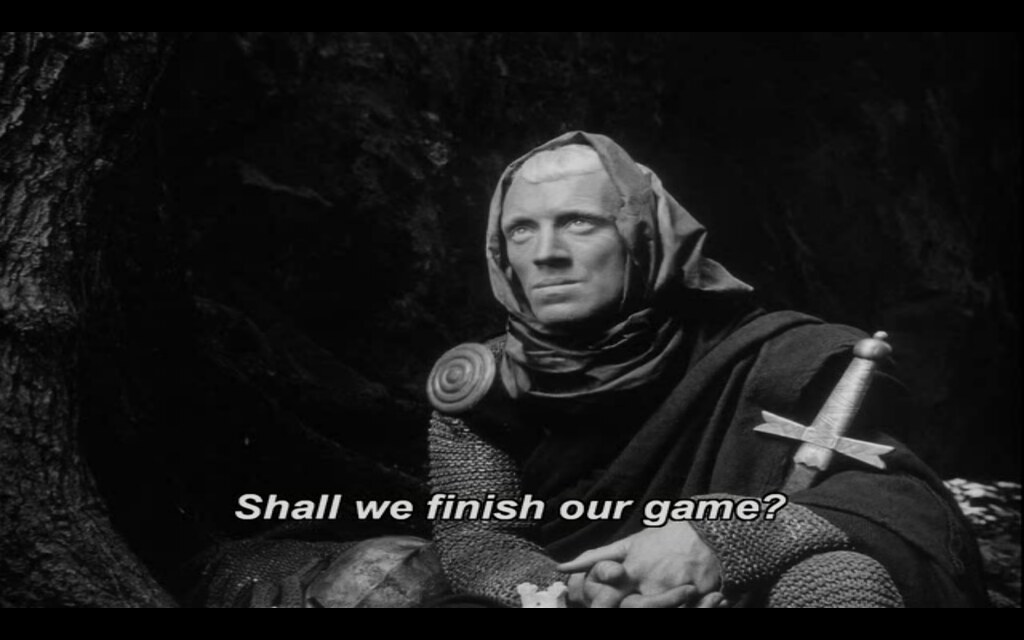
I have always had the ability to attach my demons to my chariot. And they have been forced to make themselves useful.. (Ingmar Bergman)

Olympiacos found themselves in an (unusually) difficult situation in the hours between the end of the Game 1 and the beginning of Game 2. They experienced very early in the series a harsh reality and the shocking feeling of losing height while free-falling. Olympiacos are still in a difficult situation. After 85 minutes of game with the Lithuanians at the beginning of the playoffs, it’s obvious that Zalgiris (taking into account the problems that the Reds have) are the better team of this match up. Better in terms of runs, of coaching orientation and its on-the-court court execution, better in terms of game quality. However, never underestimate how well Olympiacos may execute those small things that, under pressure, can keep you on the surface.
In extreme situations, Olympiacos are mortal and no one has challenged that since the beginning of the season. Zalgiris’ performance in Faliro as well as their consistent game coupled with Olympiacos’ injuries have awakened “demons” that had been whispering in their ears throughout this season. “Demons” that the Reds could have attached to their chariot and move on alongside them without letting their team lose its mind and path. This is how their reaction to one of the most difficult matches in the recent history of the Reds (Game 2) came, where they grabbed the lifejacket and saved themselves in the final moment. Olympiacos are in a difficult situation. But, over time, this is the situation where they subconsciously feel more comfortable to break their limits…
The team that “comes back”
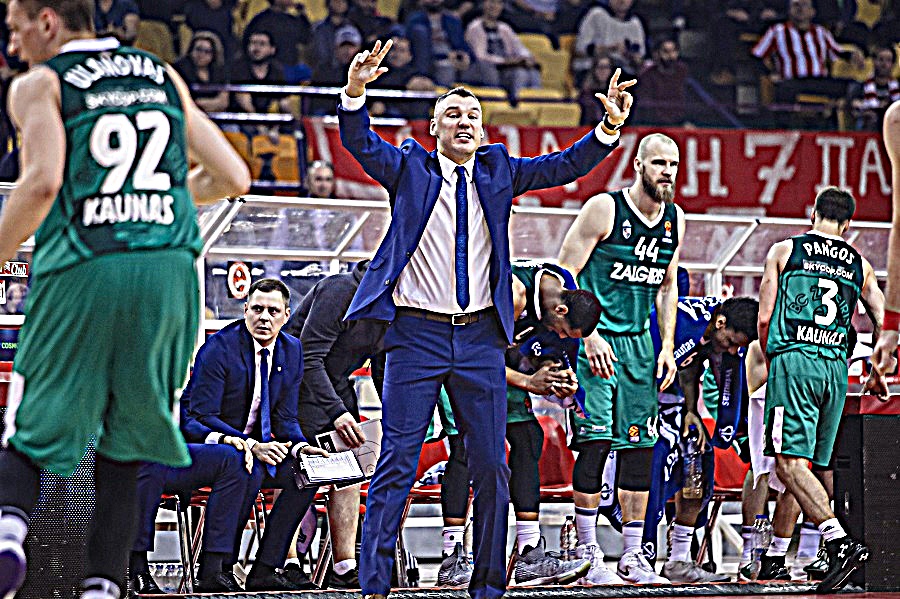
After the first two really great battles at the Peace and Friendship stadium I think that this was reason why Hoopfellad didn’t want Sarunas Jasikevicius’ team as Olympiacos’ opponent in this year’s playoffs. Zalgiris is the team with the strongest code of faith, the most powerful “symbols” and ideals in their game from possibly any other contender in the league this year. The definitely don’t have Olympiacos’ “wisdom”..
“Growing older is like climbing a mountain. You go from one top to the next. The higher you go, the weaker you get and it’s harder to breathe, but your experiences grow…”
In my opinion, this experience is the strongest ally for the crucial Game 3 of the series that will take place in Kaunas..
“They have always come back…” Jamel McLean said colourfully in the half-time of Game 2. Zalgiris is the team that comes back. Our opinion regarding the difficulty of this match up was based on this fact. Contrary to the surrounding atmosphere and the theories of the “two extremes” that took over in the country (as well as the Reds organization) the past week (from the “easy 0-3, we suck” late at the evening on Wednesday to “if we were complete and without injuries we would qualify easily”) I would personally bet, and quite confidently so, that 1-1 would have happened even if Gainnis Sfairopoulos’s team didn’t have these absences. Zalgiris comes back because they “believe”. They believe in what they work on day in day out and in the depth of this work as well. They know how to play this valuing possessions basketball better than most in this league, having dealt the cards so well that they are able to win games without having the best hands. And during the games, Olympiacos looked like the team that led in the score but that seemed temporary against a group that kept coming back and clearly played better “together”, having discarded their fears. Zalgiris lost Thursday’s game because Olympiacos made three undoubtedly difficult shots that, given the point they came, could have weighed down even the most experienced team…
Let’s take a look at a few notes from the first two matches..

-The main difference of Game 2 was the impressive defense of the Reds within the space of one pass against Zalgiris’s half-court offense. Truly outstanding and for a long while of the game. I think that Milutinov’s absence and the feeling of desperation were the key factors that led to that result.
With the Serbian Center in the court, Olympiacos’ Defensive Rating is 104.9 (the best defensive performance between the hard core of players while McLean’s 115.0 is at the bottom of this group). Without Milutinov the Reds’ defense reaches 109.1 (worst performance). Without the safety provided by Milutinov in the backcourt, Giannis Sfairopoulos’s players were forced to play with everything they had on the floor achieving high standards in this regard. The Lithuanian s’ difficulty in the entry pass at the low post (a key part of their offensive game) speaks tons of the Reds success. Coach Sfairopoulos chose not to double team against Davies’s post ups (Zalgiris is one of the most effective teams in the league in finishing plays off passes after a double team down low, especially on the weak side, these half-court fast-breaks/extra player situations we talked about here, in Hoopfellas) and gradually lest over-switching aside, switching on the wing in cases where Pangos and Milaknis went to the wing to execute (they are very good from this spot, and they execute early).
It was the pressure of the Greek defense within the space of one pass that “beat” the Lithuanian offense in terms of deplyment since the visitors found it difficult to find their off ball movement and it reduced their flow as much as possible. Note that an important part of this defensive context in Game 2 was the fact that Zalgiris didn’t take off the ball midrange shots (nor did Jankunas, who, as the stepping stone and the alternative plamaker from the High post, breaks through similar situations of defensive pressure) from the guards to change their opponents’ layout in the backcourt. Zalgiris’s several turnovers (16 as opposed to only 6 in the Game 1) were the key (and the result of the home team’s defense) for 1-1, and it will be the barometer for the rest of the series for two teams that are pretty prone to turnovers.
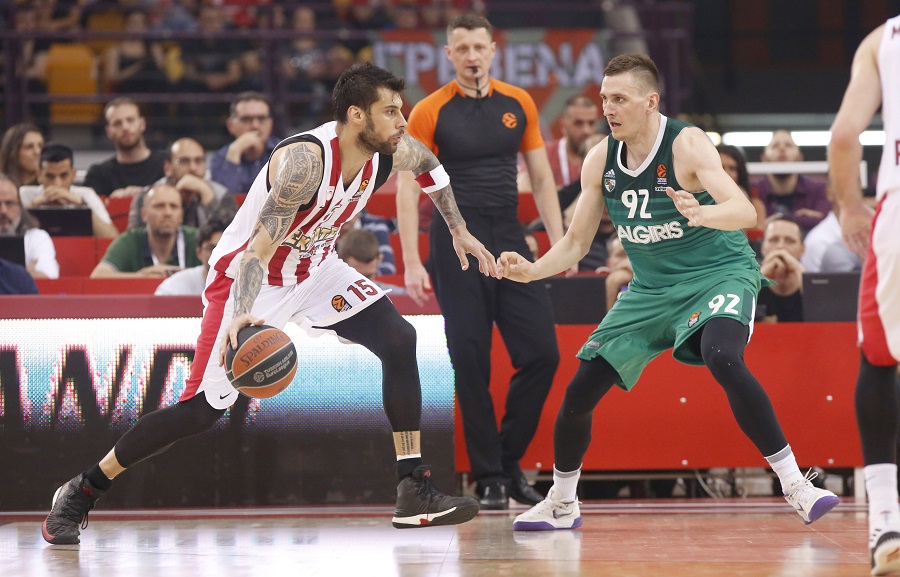
-For Zalgiris, the way they handled themselves in these first two games of the series and inside this explosive environment will probably be even greater a legacy than the break itself, as part of the wider process of spiritual maturity of the team. The Lithuanians showed their character and played their game and are now (rightfully so) facing a huge challenge as the distant cries of history echo in their ears..
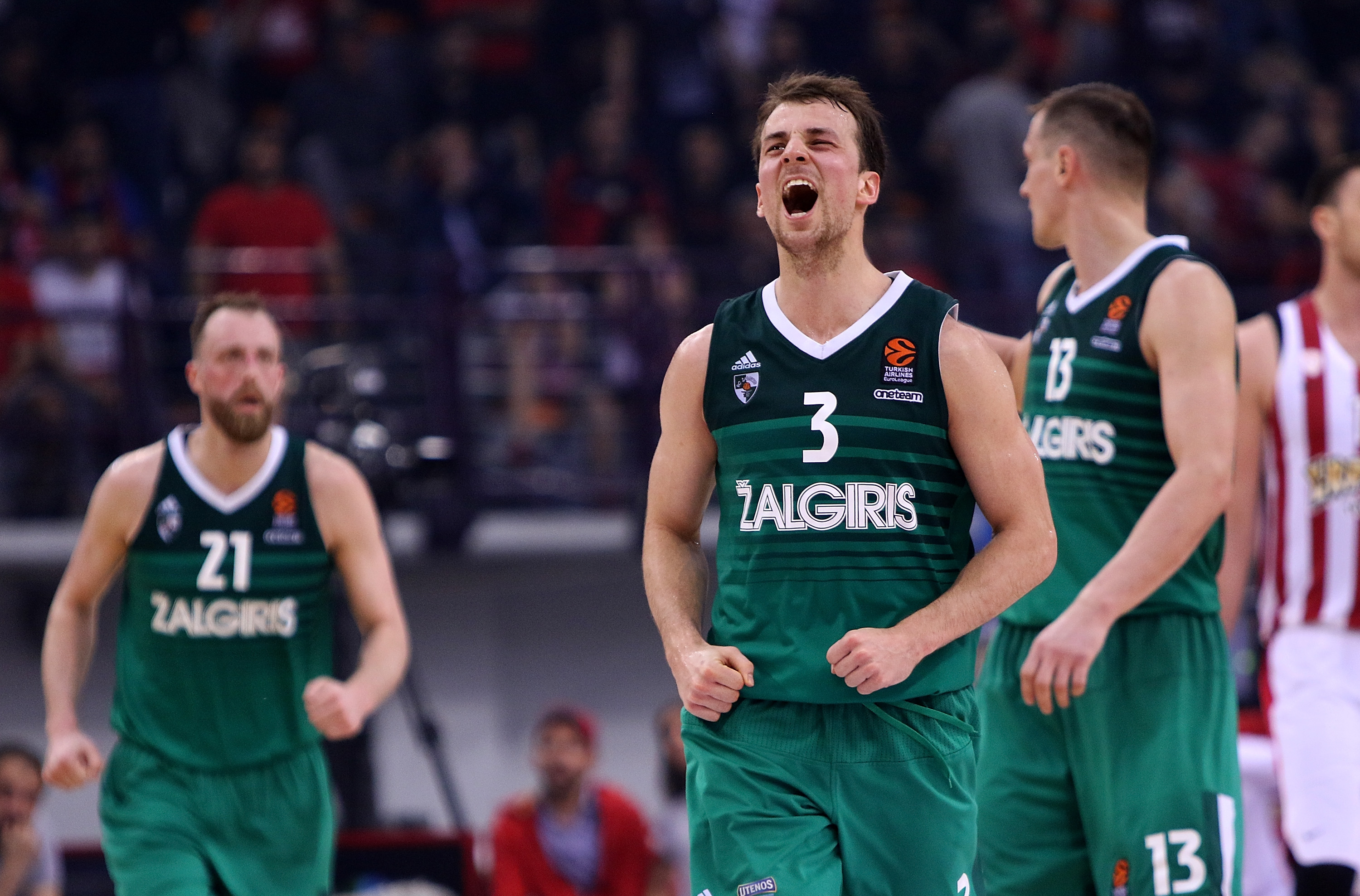
Anyone who has watched the Lithuanians throughout this season can easily understand that, overall, they didn’t reach a high level of performance, as several of their key-players did not have a good offensive game. However, they rolled at certain points of the game where their execution at both sides of the court disappointed the Greek team, which gave a rather unexpected sense of superiority to the visitors. Saras is lucky enough to have Davies in excellent shape (20.5 points, 15/25 shots – 11/13 free throws, 5.0 rebounds, 2.0 blocks in these two games) and I liked Micic’s performance who, apart from permanently gluing himself on Spanoulis in the backcourt (the original plan involved Toupane-Ulanovas), he did damage by getting inside Olympiacos’ paint either with his vertical game or by unfolding his outstanding post up repertoire. Milaknis was pretty aggressive as well and an important part of Zalgiris’s success, especially in Game 1 where the Lithuanians only had 39.6% in two-points shots. The Lithuanian’s Hammer Action (misdirection from Pangos, Weakside screen for Milaknis) tipped the balance in their favour in the “Russian roulette” that was Game 1..


Saras is extremely intelligent and a strong mind that is hard to bend. He kept changing his entry play (starting from a different format to end up to the same trick) to prevent Olympiacos’ defense from reading their game. He got a Flopy action for Milaknis from the base line to the perimeter (Box or Diamond original formation, they barely played it this year with Micic alone in the Weakside corner going up to the strong side as the second screener taking the help with him to enable the Lithuanian shooter to curl, at the Peace and Friendship stadium this wasn’t necessary because they got good shots early) while in actions during which Zalgiris switched from Horns to 2-3 High Pnr and 1-3-1 (side pick) were simply delightful.

Thumbs up to the Lithuanian team from managing to stop the middle PnR of the Reds by controlling the dribble with Hedge out and having the positions of its other three defenders as an ace up its sleeve (ready in front of the home team’s players) when Olympiacos’ ball handler was looking for the pass to break through the defense. The Lithuanians chose to avoid Switch in Game 2 in order to minimize the mismatch situations that this strategy produced, which was where the Greek offense essentially relied on. At the final stretch of Game 1, Olympiacos ended up (despite the heroics of the outstanding Spanoulis, the guy is at my age, unbelievable…) being very predictable as they were throughout the season when Printezis does not “deliver” in the Low post. In Game 2, the Reds played Flex to get the international forward at an advantageous position in the low post and Spanoulis on the middle lane. Ulanovas played Push in many of the Down Screens that the Reds used for their captain, trying to keep him away from the screener and moving to keep the distance according to the “a moving defender is hard to screen” rule.
The main problem for the central lane of the Lithuanian defense (in Game 2) was Jamel McLean and his game with the ball on the floor. The American was great on Friday (21 points, 8/12 two-pointers – 5/6 free throws) and his duel with Davies has stolen the show on a personal level in this series. Just as Spanoulis is breaking thorugh his physical ceilingl (21.0 points -6.5 assists in 30.5’), Vangelis Mantzaris’s awakening boosted Olympiacos at a turning point of the season. Note that with Mantzaris on the court this year (even like this he is still the most competent defensive guard of the team) the Reds play at their highest pace while they get to the lowest one without him, always compared to the presence of any other player from the hard core of the rotation …
In Kaunas...

At the Preview of the Game 2, we said that Olympiacos must gather up all their remaining strength and respond to Zalgiris with their best punch. That’s exactly what happened… Considering the way things have turned out due to the injuries, the Reds did their best and they are still alive in an extreme situation. 0-2 was anything but a far-fetched scenario… However, a lot has changed now. All of a sudden and in view of Game 3, the Lithuanians now experience a pressure that was missing in both Game 1 (because they would get a second chance) and in Game 2 (because they already had taken the Win in Game 1). Although the expectations were always in the back of their mind, they have now grown significantly (as it’s now obvious that Zalgiris has a good chance to turn its gaze towards Belgrade), getting Saras’ players to uncharted –for their psyche-territories.
The way things have turned out, Olympiacos took the maximum from the first two games since all their problems were a blow to their stamina. And, they have brought the series to point that doesn’t look half bad for them. I think that Game 3 will be the key. The winner will significantly increase their chances to get qualified to this year’s F4. The way things are in the middle lane in Zalgiris’s backcourt, the Reds must find good shooting from behind the arc in order to remain alive in Kaunas, getting at least one win. The Lithuanian’s Hedging may produce good shooting from behind the arc (especially when you have shooters like Strelnieks-Roberts from the wing). Also, Papanikolaou must be “there”. Without him Olympiacos will find it hard to survive. The “new element” for the Greek team is that they have to beat an opponent of the same (or even higher) basketball IQ. However, the emotional intelligence advantage still lies in Piraeus. Tension is off charts and the coaches’ need to make statements to “lay the ground” is the result of insecurities that point to lack of trust in the Euroleague. One thing is for sure, we are about to watch some epic battles..
It’s time to overcome their fears…
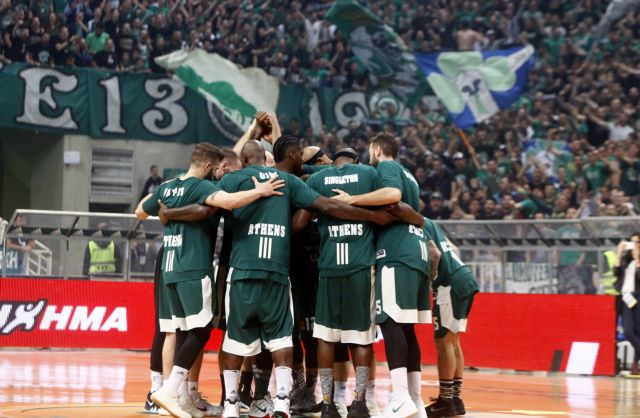
Panathinaikos are tied at 1-1 with Madrid after two completely different games and 80 minutes within which they both had their ups and downs. This was expected. We are actually exactly where we were expecting, as we had evaluated that this was very possible. The Greens travel to Madrid where they will have two chances for a break. It’s time to overcome their fears. The fear of a road win against an elite team. The fear of momentum and bad karma, which appear to be hovering over their organisation after the failure to make it to the F4 these past few years. If these games offer teams the chance to grow, to push their limits and to walk a different road, then these circumstances are ideal for the “Shamrock”, for the reason that they will have overturned a situation that is currently not in their favour. Really now, how stronger do you become when you are left standing and look your fear in the eye?
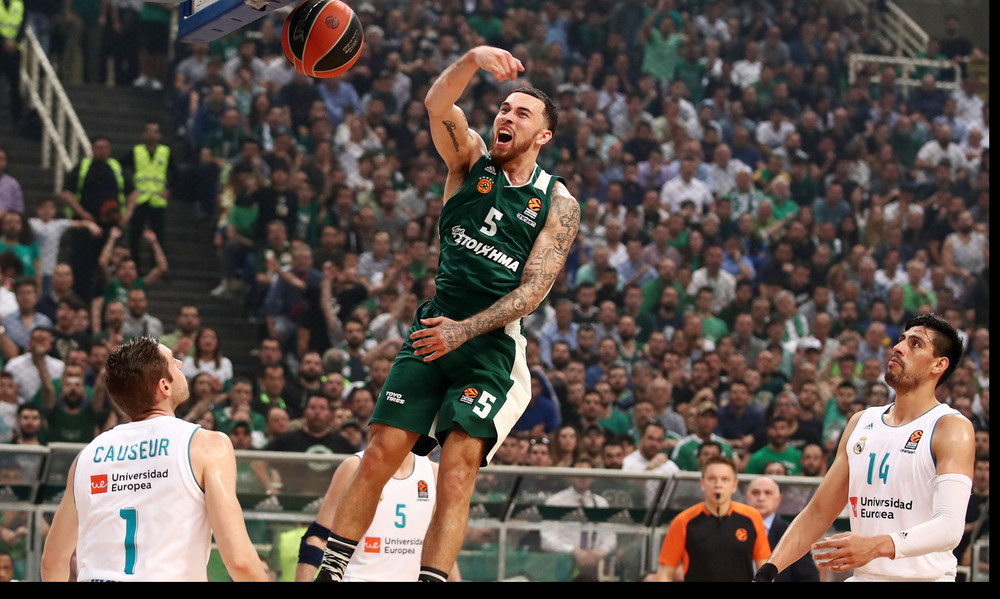
Game 1 was a dream for the Greek fans, as the “Shamrock” illustrated on the court to a great extent and in the best way (both in terms of tactical approach and in terms of execution) what they had prepared for this series (well, basically scratch that, reality was even better than their highest expectations)… With Calathes reminding us of Bob Cousy and James next to him playing what we had envisioned (evenif it was for just that night) as the “non-stop motor backcourt, which produces unlimited energy and will make the difference on spring” as we said a couple of years ago, Panathinaikos spread their opponents defense and grabbed them by the neck, landing blow after blow from the 1st minute. The hustling of the Greens defense beat on the Madrid offense wave by wave, and kept turning defense into transition offense. The Greek team was attacking from anywhere in the court (midrange execution when playing flat against PnR, close out offense, weak side, baseline and back cuts) and opened up the Madrid defense, who saw their size advantage turning into a disadvantage when trying to run together with a much faster opponent. However, as we said in the Game 2 preview, thing would be different in the next game.
Imposing such a pace does not always depend on you. It depends on several parameters and, mainly, at this level of competition, on the conduct of your opponent, since we are talking about two teams that are quite close in terms of quality. Panathinaikos should have been ready to win in a close (in terms of point difference) game on Thursday, but they didn’t do it for specific reasons.
Let’s see some of our notes from Games 1 and 2, with an eye on the Madrid matches.
Once more: No conventional battle, coach…
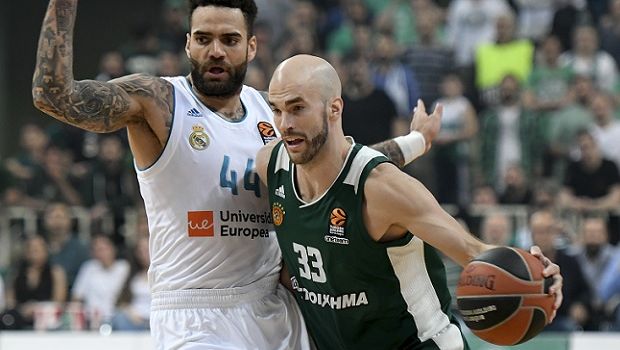
-Panathinaikos lost much ground due to their defensive “hole” of the third period in Game 2. The team was exactly perfect in the first 20’ of the game, but this slight lead at half time (40-36) was like music to my ears. Things were going as planned…
The 32 points the away team scored in the third period and their off the charts rebounding (24-43) presented a reality that looked like a train coming towards a Panathinaikos team that was tied to the rails. Panathinaikos’ total switching showed the way to the Madrilenos, who got the ball to the mismatch of the baseline, and forced the Greens defense to overhelp, due to their offensive rebounds, which in the end was devastating for the home team, as Madrid were able to produce inside-out offense and finish under very good circumstances.
James had an excellent (truly excellent) defensive game on defense in Game 1, which was followed by a very poor performance in off the ball defense. Both him and Lojeski found it very difficult to control the vertical cuts in the heart of the key or the L-cuts of Madrid’s shooters, who connected with the basket on the most crucial moment.
It’s more than obvious that Madrid’s offense is becoming more and more efficient as time goes by, adjusting to this tactical approach by Panathinaikos. They gradually feel more comfortable, they can read it much better. The Madrid players took advantage of the Greens big men inability to control the Flash Cuts (from the Low Post to the semi-circle of the High Post) by Ayon-Reyes, with the Mexican Center showing why we had highlighted before the series their ability in terms of playmaking, dragging James to the baseline (the last player on help, with an obvious size disadvantage) and win the battle of possessions in a match that would go down to the last possession. Please note that teams with this compact nature (CSKA, Khimki) usually have problems in defensive rebounds. However, in this case, the situation that was created was directly related to the defensive approach of the Greens. Panathinaikos continued to bet on this choice of theirs, even though it was obvious that the mind of their opponents felt comfortable there, and did not make things more difficult for them. At the same time, they were badly looking to go to the open court, although there was no basis that. The Greens looked like a featherweight boxer that is locked in a cage with a gigantic wrestler…

To be honest, I was left with a bitter taste by the lack of initiative of the Greens bench at that point of the night. Panathinaikos believed that they would change the momentum by following the same approach on defense, betting on steals, James’ talent, and possibly outside shooting. However, this seemed pretty sloppy. What they needed was to first change the way their opponents thought and then play with their minds. As you might have guessed, coach Pascual has to present us with something new in terms of tactical approach, and get to his own limits of anti-conformism, in order to give his team the strategic advantage of surprise. In a conventional battle, with both teams throwing the cards both coaching staffs already know on the table, things don’t looks very good for the Greek team…
-One of the good things, on which Panathinaikos can build, is the impressive 65.3% they have in 2pointers in these two games, which shows the existence of spaces and the efficiency of their team to get to the basket, especially when they got in Madrid’s paint. In Game 2, the Greens had 21/29 2 pointes (72.4%)… On the contrary, the Spaniards have had great difficulty in attacking the heart of the Greek defense, that’s why they needed so many rebounds on Thursday, which led them to the win, even in the last minute. Madrid have 33/76 2pointers in total and they are down to 43.4% (this is a team of 55+%). Trey Thompkins has been the key player for coach Laso so far, showing the most “readied hands” for the Madrid team. His ability to slip though Shuffle Screens, go to the rim and “punish” the help of the player guarding him puts enormous pressure on the defense. I have to give credit to coach Laso once more for turning Taylor and Thompkins (his own personal choices) from scorers and players that got into the game from offense, into Defensive Stoppers, quite good ones too. This was the only way for them to be part of a team that has an extremely talented roster in the long run. The 3&D character of Thompkins has been a great help to Madrid’s game.
Prerequisite: Rivers and Gist must be “there”…
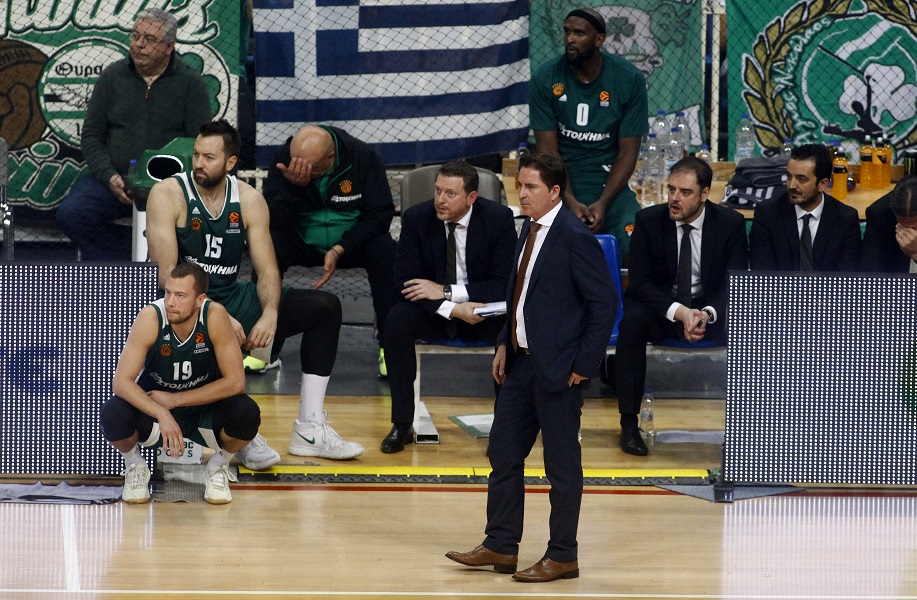
We had talked about (especially before Game 2) the fact that Panathinaikos will need a boost from their role players, and we specifically talked about Payne’s Strong finishing and Denmon’s ability to become a factor in the series.

Both Americans responded very well. Denmon (8.5 points with 5/10 3pointers in 14.5’) was –with Rivers being “out” – the best 3&D “tool” Xavi Pascual has at his disposal, showing a level of concentration (he is a rookie after all), character and a fighting spirit. Seeing the persistence and the professionalism of the American guard, after everything he’s been through (not only was he not affected, but he is “here” and is improving gradually) I am constantly thinking of what we had written last summer in respect to his potential in this year’s Panathinaikos roster, if he had at least one season “under his belt” with another Euroleague team. Payne’s presence (10.5 points with 9/9 2 pointers in less than 14’) is no surprise. It was obvious that his dynamism (in particular the way he attacks the rim) and his attributes could have helped Panathinaikos, especially in home games. The problem with the former Izzo player is that he loses the battle for positioning on defense and within the defensive rotation, which affects the entire team. Both those role players rose to the occasion. We are making a special note of those two, as the circumstances of the home games was a very good fit for their mentality and the status of their game today. The Greens will need a bit more in Madrid…
I am talking about Rivers and Gist. How different would Game 2 be if Rivers was “there” and already connected with the basket in the last 6 minutes of the game? He has been the “go to guy” of the Greens throughout the season in the final stretch of close games. Mike James has been playing this role lately, in a different, more individual process, as opposed to the Rivers era, who had more people working for his execution, which gave the team a sense of team completion followed by the successful clutch execution of the American. Rivers (who took zero shots in 13.5 minutes in Game 2…) has to be “there”, next to James in this week that will decide so many things about Panathinaikos’ season.
Talking about “fears” in the beginning of the Greens section… Panathinaikos don’t have much chance of success without Gist also coming back. He himself has to beat his fear of the Playoffs. Panathinaikos can’t make it through another series with Gist being nowhere to be found, as the F/C from Maryland is a major pillar of the team, and the team’s offensive structure. His rebounding, his presence in both personal and team defense, his ability to finish in the heart of the key. Under normal circumstances Gist must have a higher motive for the upcoming games. It’s time for him and Rivers to step up. Panathinaikos will find it very difficult without veteran leadership…
Can 1-3- defense be Xavi Pascual’s Wild Card?

As we highlighted above, when assessing the new data after 80’ of play, there is a need for Panathinaikos to throw a new card on the table. An “adjustment” or a fresh choice in an individual level, which will not be used as the main “battle tank” that will destroy their opponents, but as a Wild Card that will be thrown on the table and change the momentum in favour of Panathinaikos when this is deemed necessary. Will this be a 1-2-2 zone defense? Or maybe Mitoglou’s presence instead of Gabriel’s on the basis of the need for a more controlled player, who can increase the level of concentration and can play a significant role in rebounding (even though it’s difficult for the coach to trust a young player in this juncture)? Or maybe something completely new in terms of tactical approach…?
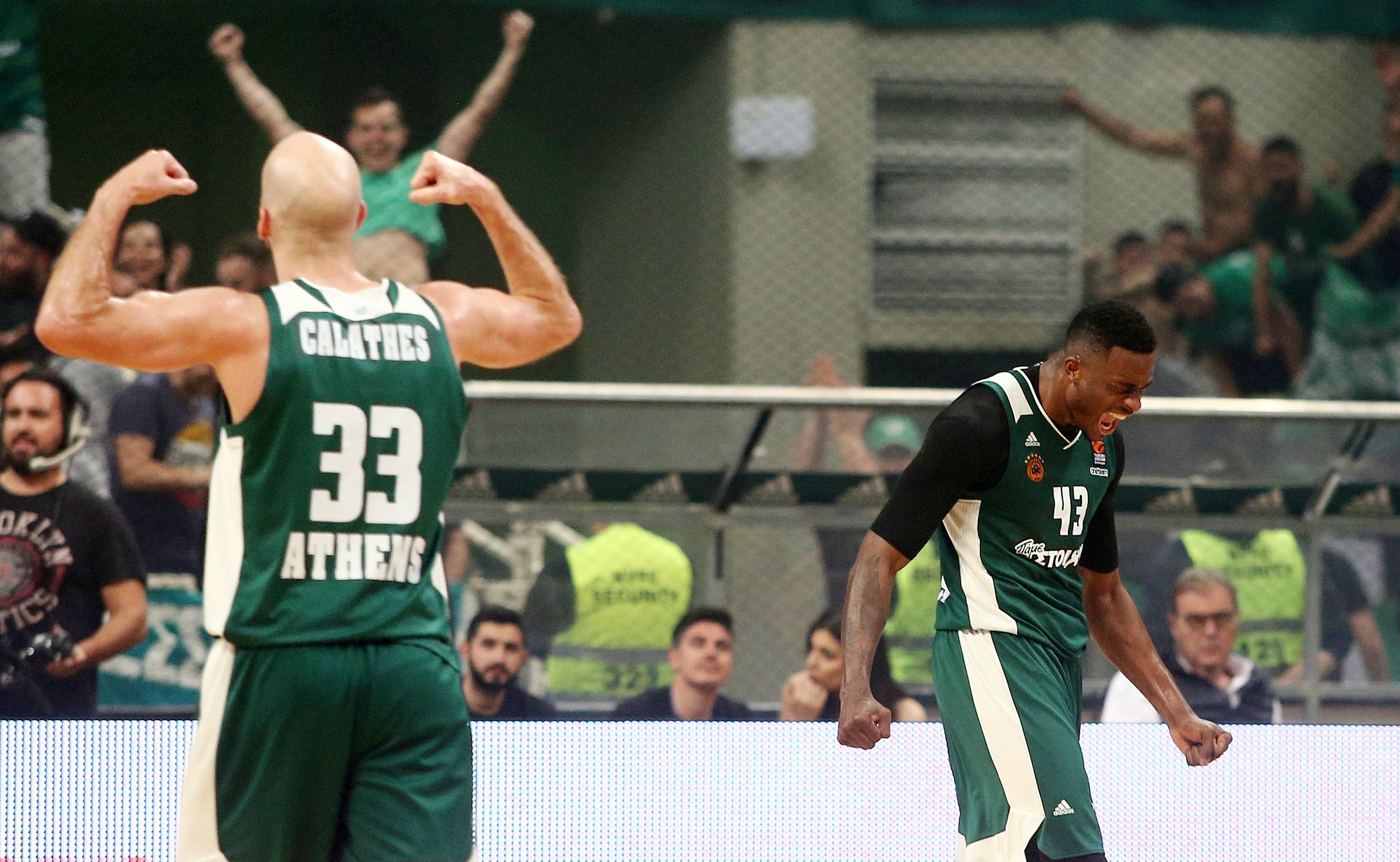
I know that it’s not easy to play a 1-3-1 zone defense if you don’t have the relevant background in the season. It’s not easy to set it up and make your players understand their roles and their responsibilities in such a small period of time if the team has not played this before a few times. However, the nature of the players of this Panathinaikos team looks ideal to run this defensive play.

With Antetokounmpo and Singleton switching between the Chaser and the Warrior positions (which requires good perception and speed, as the player has to defend in the execution along the baseline, remember Granger in last year’s series of Anadolu vs Olympiacos), Gist in the Center and a direction to turn Calathes’side into the strong side (by forcing the Madrid ballhandler to go towards that direction). This is a defense that can lead to turnovers, unlock the open court and mainly throw your opponents off their norms, which leads to them making a bigger effort to find their rhythm in the game. A team effort is needed for the rebounds (the conduct of the Greens in defensive rebounding, especially after Game 2, would be a test for when such a choice would be activated), and its Front the Post nature for the big men when the ball is on their side may become part of a more general rule for the Greek defense, which may dictate 4/4 or 3/4 aggressive (on the side entries, i.e. the entry passes from the wings) defense from the big men or the players that are really good in defending in the back line of the defense. Front the Post…

According to the latest news, Madrid will have Sergio Llull available for the games to come. The Spanish Super Star is coming off a serious injury and has not played for several months, but his presence alone (apart from the game itself, which will allow for the Madrid ball handlers to decompress) may give a significant psychological boost to the “Queen”. Coach Laso plays his hand at the right moment, but he must handle it properly, as he cannot rely on Llull they way he has relied in the past. The atmosphere is festive in Madrid. This is where Xavi Pascual’s Wild Card has to appear and put an end to the festivities. Panathinaikos may also win in Game 4. The desire, the lust for life and the anger for the potential appearance of this weakness, which limits their dreams (in case of a Game 4 with the series at 1-2 in favour of Madrid) may be the ideal emotional context for taking the Win in Game 4 in Madrid. Imagination, mental toughness and readiness is required.

“There’s always struggle in me between my urge to destroy and my will to live . . . This creates an internal tension that dominates the way I create and my material existence. Every morning I wake up with a new wrath, a new suspiciousness, a new desire to live”.
Ingmar Bergman
P.S.: “Watching a complex defense, strictly structured for a particular situation in Real’s offense, with specific, short-terms goals, to be lining up by switching from zone to man to man defense in the last seconds is something that encloses all the charm of this (not simple in the least but) complex sport. Old School coaching translated in the basis of contemporary basketball. A Chesterfield sofa and a Francis Scott Fitzgerald book inside a spaceship…”
Hoopfellas on David Blatt’s 1-3-1 zone defense (an expert of this zone defense, his know-how is incomparable) last year in Madrid…

P.S.1: Khimki was very competitive, but they were “betrayed” by their “Achilles heel” of rebounds in Game 1 and their excessively peripheral offensive character in Game 2 against an opponent that “safely” made it to their paint. A great lost chance to make CSKA walk the line of insecurity (facing a difficult situation without Hines and De Colo). Credit to Dimitris Itoudis, who kept his team “together” in Game 2, with the shock of losing De Colo being in everyone’s mind. It’s not difficult to lose focus…
P.S.2: White smoke… Is it time for “traditional powerhouses” to rise again in the East…?

P.s.3: This is what I want to see. Over time…
[PLEASE INSERT VIDEO]
Translated by George-Orestis Zoumpos and Katerina Antoniou



